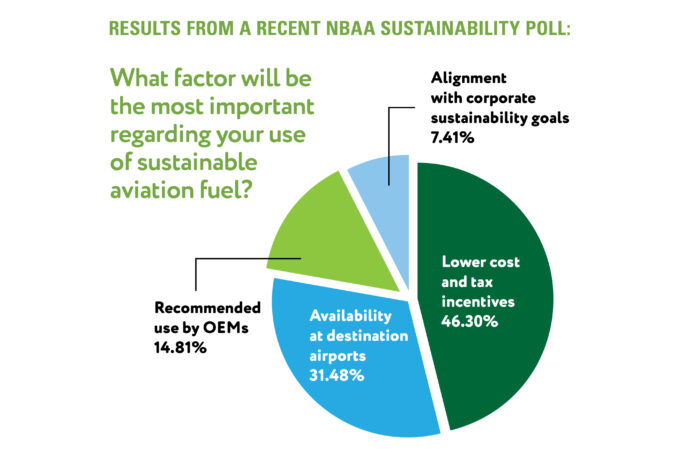From utilizing sustainable aviation fuels (SAF) to power efficient aircraft housed in environmentally responsible hangars, to utilizing renewable, reusable and recycled products throughout their flight operations, business aviation stakeholders are focusing on meeting the challenge of reducing greenhouse gas (GHG) emissions to ensure a greener tomorrow for the industry.
While each of these actions plays an important role in further reducing business aviation’s already small carbon footprint – which comprises just 0.04% of global man-made carbon emissions – perhaps the greatest contributor to this goal is expanding the availability and use of SAF. Partially derived from renewable feedstocks, these fuels can reduce lifecycle GHG emissions by up to 80% compared to conventional jet fuel.
As the industry works rapidly toward electrification and other near-future, zero-emission propulsion solutions, NBAA and other stakeholders continue to commit to SAF and a variety of other measures to curb emissions right now.
“We are committed to be net-zero emissions as a company by the end of 2022 and carbon neutral by the end of this year.”
BROCK JORDAN Chief Pilot, Netflix
Going Greener Today
For example, fractional ownership provider NetJets, one of the largest fleet operators of business aircraft, has committed to purchasing 100 million gallons of SAF over the next 10 years. Since 2015, NetJets has cut more than 43 million metric tons of CO2 through its Blue Skies initiative, which enables customers to offset emissions from their flights.
Many Fortune 100 companies that use business aircraft have also set aggressive targets to cut their carbon, water and waste footprints in half by 2030. More have committed to offsetting 100% of emissions attributable to their business aircraft flights.

“We are committed to be net-zero emissions as a company by the end of 2022 and carbon neutral by the end of this year,” said Brock Jordan, chief pilot for Netflix. “In addition to using SAF across our fleet of [Beechcraft] King Air 350 shuttles, we also utilize all-electric vehicles and GPUs, and use sustainable or compostable products wherever possible.”
FBOs have also embraced sustainable practices. When the need for a second hangar became apparent, Gary Jet Center (GJC) at Gary/Chicago International Airport (GYY) opted to construct the facility with Leadership in Energy and Environmental Design (LEED) certification from the U.S. Green Building Council in mind.
“The decision to pursue LEED accreditation was made from the initial concept,” said GJC President Lynn Eplawy. “We examined every part of the design and identified the changes necessary for a more environmentally-friendly approach. It was just the right thing to do.”
Constructed in 2010, the hangar employs a refrigerant-free ventilation system and LED lighting. Exterior surfaces and the hangar floor are molded in color and required no additional paint or sealant to finish. Demolition crews recycled more than 75% of waste from tearing down the vintage hangars that the new building replaced.
GJC later adopted similar practices for the terminal that opened in early 2017, in addition to other recycling and sustainability policies throughout its facilities.
“The overall cost differential is negligible, with most added expenditures offset by savings in other areas,” Eplawy said of the sustainability effort. “We felt it was important to look beyond our basic business plan and take pride in our responsibility as stewards of the environment.”

Developing A Plan
Efforts to adopt sustainable aviation practices often begin with reviewing the parent company’s overall environmental policy, although these goals may not always be readily communicated with the flight operation.
“Aviation managers should seek out information about these [company sustainability] programs to help determine their own initiatives in line with company programs,” said Jessica McClintock, vice president, global account management for FuelerLinx. McClintock also recommends that operators avail themselves of resources available from NBAA and sustainability-focused organizations outside the industry.
One key NBAA initiative is its Sustainable Flight Department Accreditation Program, which was launched in early 2021 to advance a sustainability culture in business aviation organizations and recognize those that meet or exceed specified criteria in flight, operations, ground support and infrastructure. The program encourages participating organizations to think and act critically toward implementing as many sustainability strategies as possible, while also recognizing the diversity of business aviation operations.
“We currently have select companies participating in a pilot program to determine accreditation criteria,” said Stewart D’Leon, NBAA’s director for environmental and technical operations. “They’ve shared a wealth of important information with NBAA and each other in defining options for our industry.”
Netflix is among the companies participating in the pilot program. “We’re evaluating the main focus areas now to help companies understand their options and the financial commitments required,” noted Jordan. “Scalability of these solutions will be key to their success, and education will be the driving force.”
Learn more about sustainable aviation fuel at nbaa.org/saf and NBAA’s sustainability accreditation at nbaa.org/sustainability
NBAA Forms Dedicated Sustainability Subcommittee
The newly formed Sustainability Subcommittee of the NBAA Maintenance Committee is working to develop educational resources to help business aircraft operators pursue initiatives to foster greater environmental awareness industry-wide.
“We’re in the infancy stage, but we know where to start working to identify areas for engagement with our membership,” said Stewart D’Leon, NBAA’s director for environmental and technical operations. “We may not have all the solutions yet, but we’re focused on providing vehicles by which to determine answers and share them with the industry.”
Subcommittee Co-Chair and Netflix Chief Pilot Brock Jordan said the group’s initial focus will be on developing new educational resources to help guide flight operations in establishing their own sustainability programs.
“Every flight department has different resources and bandwidth,” he explained. “We’re building from the ground floor, but our long-term commitment includes education, leveraging existing programs and resources, and standardizing solutions in line with NBAA’s accreditation program and other association programs to build a sustainable front through 2050.”
“Sustainability means that we’re thinking about our future, and to make the biggest impact we must come together as an industry,” added Subcommittee Co-Chair Jessica McClintock who also is vice president, global account management for FuelerLinx. “While no one person, committee or company can do it all, it’s important that we each take our own initial steps toward the greater good and a greener future.”
NBAA-BACE to Host Second Annual Industry Sustainability Summit

In September 2020, the inaugural Business Aviation Sustainability Summit provided an important virtual platform for industry stakeholders to demonstrate thought leadership in aviation emissions reduction while providing a roadmap for promoting the production, availability and use of sustainable aviation fuel (SAF).
The industry’s ongoing commitment to a sustainable future will be showcased at the second annual Business Aviation Sustainability Summit, to be held Oct. 12 in conjunction with the 2021 NBAA Business Aviation Convention & Exhibition (NBAA-BACE) in Las Vegas, NV. (For more details, visit nbaa.org/safsummit.)
Summit highlights will include two moderated sessions that will address common questions about SAF and sustainability across business aviation:
- “A Supplier Perspective on SAF” will examine the important role of sustainable aviation fuel in the era of increased environmental concerns and “flight shaming.”
- “Eliminate Your Aircraft’s Emissions – It’s Possible Today” will focus on the tools available to help chart a company’s aviation sustainability plan right now.
Additional sessions will highlight aircraft flying to and from Las Vegas using SAF, as well as those utilizing book-and-claim transactions to lock in carbon offsets when SAF is not available.
Networking opportunities will enable industry stakeholders to consult on methods to assist their companies in reducing their carbon footprints.
Also, during the summit, the National Aeronautic Association will formally award Gulfstream with its first Sustainable Wings certification for a record-setting flight from Savannah, GA to San Francisco, CA and back in a G500 fueled with SAF.



 International Business Aviation Council Ltd.
International Business Aviation Council Ltd.